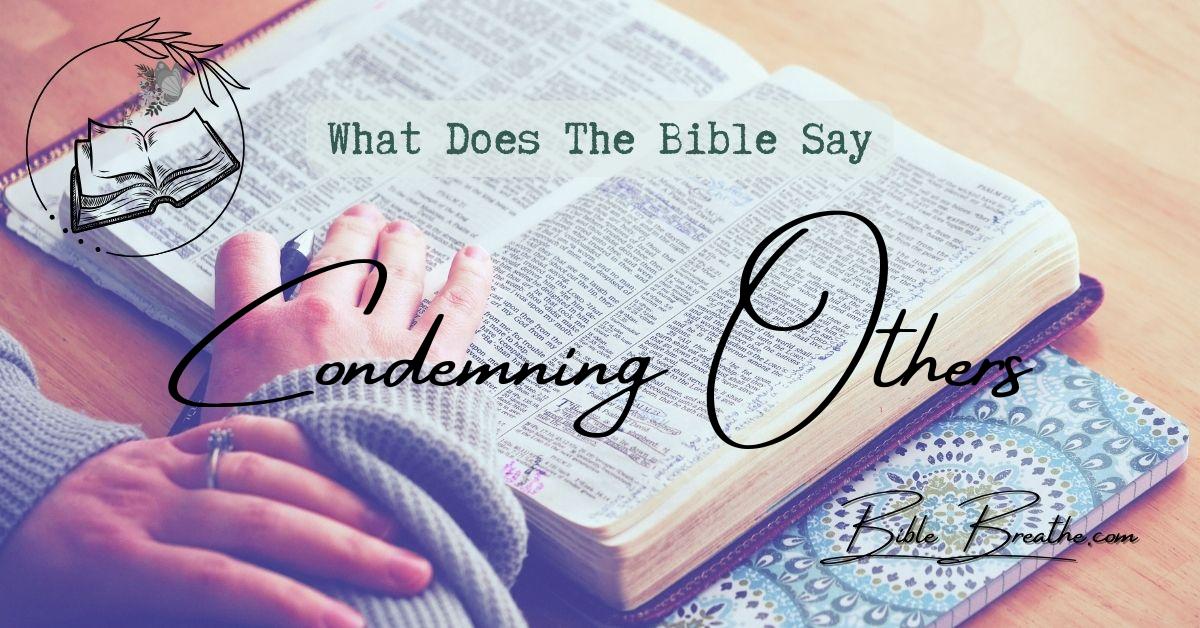What does the Bible really say about condemning others?
It’s like having a heart-to-heart with the good Book itself, and believe me, there’s more to it than meets the eye.
You see, condemnation isn’t just about pointing fingers; it’s about understanding divine grace and mercy in our everyday lives.
The Bible isn’t just a rulebook for judgment, it’s a guide to forgiveness, righteousness, and salvation.
It’s about recognizing our own faults before we’re quick to judge.
Picture this: it’s not about throwing stones, it’s about building bridges.
So, as we journey through these sacred words, we’re going to unearth the timeless wisdom that’s as relevant today as it was back then.
We’ll unpack the true meaning of condemnation, diving deep into scripture, and embracing the grace, forgiveness, and redemption that it offers.
Are you ready to explore what the Bible really says about condemning others?
Let’s dig in!
🌟
Key Takeaways
-
Approach with Love and Understanding: The Bible emphasizes the significance of approaching others with love and understanding rather than condemnation. In Matthew 7:1-2, it says, “Judge not, that you be not judged. For with the judgment you pronounce, you will be judged, and with the measure you use, it will be measured to you.” This underscores the need for empathy and compassion in our interactions with others.
-
Beware of a Judgmental Attitude: The Bible warns against adopting a judgmental attitude. In Luke 6:37, it advises, “Judge not, and you will not be judged; condemn not, and you will not be condemned; forgive, and you will be forgiven.” This cautionary message reminds us of the perils of passing harsh judgments on others.
-
Reflect Christ’s Love and Forgiveness: The core of the Bible’s teachings on condemning others is to reflect Christ’s love and forgiveness. In John 8:7, when confronted with the woman caught in adultery, Jesus said, “Let him who is without sin among you be the first to throw a stone at her.” This exemplifies Christ’s mercy and encourages us to extend forgiveness and grace to those we may be tempted to condemn.
-
Humility and Self-Examination: To avoid condemning others, the Bible encourages self-examination and humility. Galatians 6:1 advises, “Brothers, if anyone is caught in any transgression, you who are spiritual should restore him in a spirit of gentleness. Keep watch on yourself, lest you too be tempted.” This verse underscores the importance of addressing issues in a spirit of gentleness and self-awareness.
-
A Path to Reconciliation: Ultimately, the Bible’s teachings on condemning others guide us towards reconciliation and restoration rather than judgment and condemnation. It invites us to embody Christ’s love and forgiveness in our interactions, fostering a spirit of unity and grace within the community of believers.
Embracing Compassion Over Condemnation
Photo modified by BibleBreathe.com. Original photo by Sora Shimazaki on Pexels
Condemnation – a heavy word that can cast shadows over our lives.
It’s like a storm cloud in the sky, ready to pour down rain on our souls.
But in the pages of the Bible, we find a guiding light, urging us towards compassion and understanding in our journey through life.
The Warning Against Passing Judgment – Romans 2:1
In our quest to understand condemnation, our first stop is Romans 2:1.
Think of it as a caution sign on a winding road, telling us to slow down and think twice before judging others.
“Therefore thou art inexcusable, O man, whosoever thou art that judgest: for wherein thou judgest another, thou condemnest thyself; for thou that judgest doest the same things.” – Romans 2:1 (KJV)
This verse reminds us that when we judge, we’re treading on thin ice.
Just as we point fingers, we must remember that we too have our imperfections.
It’s a call for humility and empathy in our interactions with fellow travelers on this journey.
Extending a Hand, Not a Pointing Finger – Luke 6:37
Luke 6:37 is like a guiding star in the night sky.
It beckons us to embrace mercy, to offer a helping hand instead of a condemning finger.
“Judge not, and ye shall not be judged: condemn not, and ye shall not be condemned: forgive, and ye shall be forgiven.” – Luke 6:37 (KJV)
This verse is a fundamental principle of human connection.
It’s a plea for empathy, a reminder that we all stumble in this journey called life.
By showing mercy and refraining from condemnation, we create a path towards a compassionate and understanding world.
God’s Desire for Salvation – John 3:17
John 3:17 shines as a lighthouse in the darkness.
It reveals God’s ultimate intention for the world – salvation, not condemnation.
It asks us to consider if our actions align with this divine purpose.
“For God sent not his Son into the world to condemn the world, but that the world through him might be saved.” – John 3:17 (KJV)
If God’s mission is one of salvation and not condemnation, should we not strive to embody a similar ethos in our interactions with others?
This verse reminds us to be ambassadors of salvation, spreading love, understanding, and compassion where it’s needed most.
A Caution Against Judgment – Matthew 7:1
Imagine Matthew 7:1 as a road sign cautioning us to drive carefully through life.
It’s a red flag, reminding us of our own imperfections.
Instead of condemning, perhaps we should extend a helping hand to those who’ve stumbled.
“Judge not, that ye be not judged.” – Matthew 7:1 (KJV)
This verse is a mirror reflecting our tendency to judge.
It’s a call to pause and reflect on our actions, to consider the consequences of our judgments.
Instead of harsh criticism and condemnation, a more compassionate approach may be the way forward.
Finding Sanctuary in Christ – Romans 8:1
Finally, Romans 8:1 reveals a sanctuary in the midst of condemnation’s storm.
It assures us that in Christ, there is no condemnation.
It’s like finding a safe harbor in the midst of a tempest.
“There is therefore now no condemnation to them which are in Christ Jesus, who walk not after the flesh, but after the Spirit.” – Romans 8:1 (KJV)
As we journey through life, remember that offering a helping hand can be far more powerful than pointing fingers in judgment.
Let us embody the mercy and understanding that our Creator has shown us, extending compassion and grace to our fellow travelers on this shared journey.
Unraveling Condemnation in the Bible
Photo modified by BibleBreathe.com. Original photo by Markus Winkler on Pexels
In the magnificent tapestry of biblical teachings, delving into the theme of condemning others takes us on a profound journey.
It’s not merely about dishing out judgments; it’s about unearthing the deeper layers of context and consequences.
The Tapestry of Culture and History
To truly grasp what the Good Book says about condemning others, let’s take a moment to rewind the clock and immerse ourselves in the rich cultural and historical landscapes of biblical times.
Back then, much like today, people grappled with the weighty matters of judgment and condemnation.
It was a delicate dance between holding individuals accountable and showing mercy.
“Judge not, that ye be not judged.” – Matthew 7:1 (KJV)
This gem from the book of Matthew shines as a guiding light, urging us to reflect on our natural inclination to pass judgment on our fellow travelers in this journey called life.
It’s a reminder that the standards we use to judge others will ultimately be turned upon us.
Divine Assessment vs. Human Condemnation
One often-overlooked facet is the clear boundary between divine assessment, administered by a higher authority, and human condemnation, which often springs from our own biases, limited perspectives, and life experiences.
The divine judgment, as depicted in the Scriptures, is rooted in righteousness and truth.
It’s an evaluation of our deeds against the moral blueprint set forth by the Divine Creator.
In contrast, human condemnation tends to be flawed, colored by our prejudices and incomplete comprehension.
For all have sinned, and come short of the glory of God.” – Romans 3:23 (KJV)
Acknowledging our own imperfections and recognizing our shared humanity can soften our stance toward others.
It fosters an attitude of forgiveness and empathy, knowing that we all journey through life with our fair share of missteps, seeking grace and understanding.
The Road to Redemption and Mercy
The Bible paints a vivid picture of the path to redemption and mercy, underscoring the significance of forgiveness and repentance.
It urges us to rise above the temptation to condemn and to embrace the transformative power of love and compassion.
“Let him who is without sin among you be the first to throw a stone…” – John 8:7 (KJV)
This verse from the Gospel of John vividly illustrates Jesus’ teaching on refraining from condemning others.
It beckons us to take a long, hard look at our own imperfections before casting judgment on our fellow travelers.
In summary, the Bible extols a compassionate and empathetic approach toward our fellow journeyers, reminding us that we all navigate life’s winding paths with our own flaws and stumbles.
By embracing divine principles of mercy, forgiveness, and love, we can transcend the urge to condemn and, instead, contribute to a world adorned with grace and understanding.
The Ripple Effect of Condemnation
Photo modified by BibleBreathe.com. Original photo by Sora Shimazaki on Pexels
Condemning others – it’s like tossing a stone into a calm pond, creating ripples that reach far and wide, affecting both the spiritual and societal landscapes.
These ripples extend beyond the moment of judgment, shaping hearts, minds, and relationships in profound ways.
The Spiritual Consequences
At its core, condemnation is a form of judgment where we appoint ourselves as divine judges.
This not only reveals our lack of humility but also carries significant spiritual weight.
“For with what judgment ye judge, ye shall be judged: and with what measure ye mete, it shall be measured to you again.” – Matthew 7:2 (KJV)
This biblical wisdom calls for introspection.
It asks us to reflect on the judgment we cast upon others.
Are we prepared to face the same level of judgment for our own actions?
It challenges us to scrutinize our criticisms and condemnations.
The Societal Impact of Judgment
Beyond the individual, a judgmental attitude can poison the well of society.
It nurtures an environment filled with criticism, accusations, and division, corroding the foundation of peaceful coexistence.
“A new command I give you: Love one another. As I have loved you, so you must love one another.” – John 13:34 (KJV)
In these words, Jesus lays down a fundamental commandment – to love one another.
When we engage in condemnation, we stray from this divine directive.
Society thrives on compassion, empathy, and understanding.
Condemnation, on the other hand, only sows discord and hostility.
The Cycle of Repentance and Redemption
Throughout the Bible, a recurring theme is the concept of repentance and redemption.
Even for those who have faltered and strayed from the righteous path, there remains an opportunity for change and growth.
“Come now, and let us reason together, saith the LORD: though your sins be as scarlet, they shall be as white as snow…” – Isaiah 1:18 (KJV)
God’s grace knows no bounds, offering a chance for transformation.
Instead of condemning, the Bible encourages us to stand alongside one another in the journey towards righteousness and redemption.
It’s an invitation to support, uplift, and guide each other on our individual paths of faith.
A Final Thought
In the intricate tapestry of human interactions, our words and actions possess immense power.
The Bible calls on us to wield that power responsibly, steering clear of condemnation, and embracing a path of understanding, forgiveness, and love.
In doing so, we contribute to a society founded on unity, empathy, and the potential for redemption for all.
Let us heed these teachings, for by living them, we shape a world where love and understanding reign – a world where condemnation has no place.
Embracing Forgiveness: A Divine Perspective
Photo modified by BibleBreathe.com. Original photo by Ashlee Marie on Pexels
In the intricate tapestry of human connections, forgiveness stands as a thread capable of mending even the most intricate knots of strife and discord.
It’s a virtue that the Bible holds in high regard, illustrating its profound impact on our lives.
Divine Insights on Forgiveness
Within the pages of the Bible, we discover a wealth of wisdom, and forgiveness shines as a radiant gem.
Numerous verses underscore the importance of forgiving others, illuminating the path toward inner serenity and harmony.
“And when ye stand praying, forgive, if ye have ought against any: that your Father also which is in heaven may forgive you your trespasses.” – Mark 11:25 (KJV)
This verse from the book of Mark serves as a gentle reminder that forgiveness isn’t merely a kindness we extend to others; it’s a grace we bestow upon ourselves.
Clinging to grudges burdens the soul, impeding our spiritual journey.
Forgiveness, however, liberates us, enabling us to move forward unburdened.
The Dance Between Forgiveness and Condemnation
Forgiveness and condemnation are like parallel paths that never converge.
Condemnation seeks judgment and punishment, while forgiveness aspires to understanding and elevation.
“Judge not, and ye shall not be judged: condemn not, and ye shall not be condemned: forgive, and ye shall be forgiven.” – Luke 6:37 (KJV)
Luke 6:37 paints this picture eloquently.
It calls us to relinquish the gavel of condemnation and instead, embrace the wings of forgiveness.
When we condemn, we perpetuate a cycle of judgment and suffering.
But when we forgive, we break those chains, allowing healing and understanding to take root.
Righteousness and Divine Discernment
The concept of righteousness is intricately woven with divine judgment.
The Bible presents divine judgment as an act of discernment rooted in righteousness, not as a condemnation tainted by bias or prejudice.
“Judge not according to the appearance, but judge righteous judgment.” – John 7:24 (KJV)
John 7:24 advises us to judge with righteousness, to discern with fairness and understanding.
It’s a reminder that when we pass judgment, we should do so from a standpoint of righteousness, not influenced by bias or superficiality.
Mercy and Grace: The Cornerstones of Forgiveness
Mercy and grace form the very bedrock of forgiveness.
They are the heartbeats of compassion, inviting us to extend a hand to those who may have faltered.
“But go ye and learn what that meaneth, I will have mercy, and not sacrifice: for I am not come to call the righteous, but sinners to repentance.” – Matthew 9:13 (KJV)
Matthew 9:13 encapsulates the essence of mercy and grace.
It reminds us that our purpose should mirror the divine purpose—to call sinners to repentance, to offer mercy and grace, rather than to condemn.
The Path to Repentance and Redemption
In the Bible, the path to redemption is paved with repentance and forgiveness.
It’s an acknowledgment of our imperfections and a humble plea for divine understanding.
“Repent ye therefore, and be converted, that your sins may be blotted out, when the times of refreshing shall come from the presence of the Lord.” – Acts 3:19 (KJV)
Acts 3:19 speaks of repentance and the refreshing salvation it brings.
It’s an invitation to turn away from condemnation, embrace forgiveness, and find renewal in the grace of salvation.
Through this exploration, we’ve journeyed through the biblical terrain, recognizing forgiveness as a beacon of hope in a world often clouded by judgment.
As we immerse ourselves in these teachings, let us aspire to forgive, to understand, and to walk the path of righteousness, guided by the grace of mercy and the promise of salvation.
Frequently Asked Questions (FAQs) About What Does The Bible Say About Condemning Others
Why does the Bible warn against judging others?
The Bible advises against judgment to promote mercy and humility.
We should focus on self-improvement and support rather than harshly assessing others.
How can one avoid the trap of condemning others?
Avoiding condemnation is emphasized in Matthew 7:1-5, where Jesus advises not to judge others harshly.
Instead, practice understanding, forgiveness, and humility.
Recognize your own imperfections and extend grace to others, striving for a spirit of love and empathy.
What is the difference between righteous judgment and condemnation?
Righteous judgment involves discernment based on God’s principles without harsh condemnation.
John 7:24 encourages fair judgment.
Condemnation, however, involves passing severe, final judgment on others, often without mercy or an opportunity for redemption.
Romans 8:1 highlights the absence of condemnation for those in Christ Jesus.





